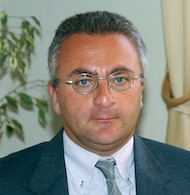
In compliance with Italian rules, please remember that in order to participate in person to the NI 2022 workshop, it is mandatory that all attendees wear an FFP2 type mask.
All times are in Central European Summer Time (CEST)
June 13
14:45-15:45 — SESSION 1: Network Intelligence at the edge
Session Chair: Laura Galluccio (University of Catania, Italy)
Implementation of Federated Learning on Resource-constrained devices: Lessons learned
Thomas Tsouparopoulos, Athens University of Economics and Business, Greece
Iordanis Koutsopoulos, Athens University of Economics and Business, Greece
Contradiction Management in Intent-driven Cognitive Autonomous RAN
Anubhab Banerjee, Nokia Bell Labs & Technical University of Munich, Germany
Stephen S. Mwanje, Nokia Bell Labs, Germany
Georg Carle, Technische Universität München, Germany
Tailoring FANET-Based 6G Network Slices in Remote Areas for Low-Latency Applications
Christian Grasso, University of Catania, Italy
Raoul Raftopoulos, University of Catania, Italy
Giovanni Schembra, University of Catania, Italy
15:45-16:30 — KEYNOTE
Software Defined Systems: Integrating the Cyber World with the Internet of Things by Leveraging on Network Intelligence
Speaker: Antonio Puliafito, University of Messina, Italy
A smart city represents an improvement of today’s cities both functionally and structurally, that strategically utilizes many smart factors, such as information and communications technology (ICT), to increase the city’s sustainable growth and strengthen city functions, while ensuring citizens’ quality of life and health. Cities can be viewed as a microcosm of “objects” with which citizens interact daily: street furniture, public buildings, transportation, monuments, public lighting and much more. Moreover, a continuous monitoring of a city’s status occurs through sensors and processors applied within the real-world infrastructure. Industrial sites represent similar scenarios, where data collected from distributed objects allow to actuate powerful control strategies.
The Internet of Things (IoT) concept imagines all these objects being “smart”, connected to the Internet, and able to communicate with each other and with the external environment, interacting and sharing data and information. Each object in the IoT can be both the collector and distributor of information regarding mobility, energy consumption, air pollution, as well as potentially offering cultural and tourist information.
As a consequence, cyber and real worlds are strongly linked in a smart city, such as in industrial site. New services can be deployed when needed and evaluation mechanisms will be set up to assess the health and success of the system under control. This talk will present some innovative developments in areas related to smart cities and smart industries, leveraging on the features supported by network intelligence at the edge of the network.

Antonio Puliafito is a full professor of computer engineering at the University of Messina, Italy. His interests include parallel and distributed systems, networking, IoT, Cloud computing, advanced analytical modeling techniques. He regularly acts as a referee for the European Community since 1998. He contributed to the development of the software tools WebSPN, ArgoPerformance and Stack4Things. He co-authored the text entitled "Performance and Reliability Analysis of Computer Systems", edited by Kluwer. From 2006 to 2008 he acted as the technical director of the Project 901, winner of the CISCO innovation award. He actively contributed to the success of the TriGrid VL and PI2S2 projects. He has been working in several EU funded projects such as: Reservoir, Vision Cloud, CloudWave, Beacon, Frontier Cities. He was also the main investigator of the Italian PRIN2008 research project Cloud@Home, to combine cloud and volunteer computing. He acted as scientific coordinator of the PON 2007-2013 SIGMA project on using cloud computing to manage severe risk phenomena. He is coordinating the #SmartME crowdfunding initiative to develop a smart city framework in the city of Messina. He is the co-founder of SmatMe.io, a startup working on the integration of cloud and IoT in smart cities contexts. He leads the Toolsmart project to enhance re-using of smart city solutions in the cities of Turin, Padua, Lecce and Syracuse.
17:00-18:20 — SESSION 2: Intelligence for network management
Session Chair: Giovanni Schembra (University of Catania, Italy)
PRISMA: A Packet Routing Simulator for Multi-Agent Reinforcement Learning
Redha Abderrahmane Alliche, Université Côte d'Azur, CNRS, I3S, France
Tiago Da Silva Barros, Université Côte d'Azur, CNRS, I3S, France
Ramon Aparicio-Pardo, Université Côte d'Azur, CNRS, I3S, France
Lucile Sassatelli, Université Côte d'Azur, CNRS, I3S, France
Attention Networks for Time Series Regression and Application to Congestion Control
Victor Perrier, TESA, France
Emmanuel Lochin, ENAC & Université de Toulouse, France
Jean-Yves Tourneret, University of Toulouse & ENSEEIHT, France
Patrick Gelard, CNES, France
Centrality-aware gossiping for distributed learning in wireless sensor networks
Joannes Sam Mertens Joseph Thatheyus, University of Catania & CNIT, Italy
Giacomo Morabito, University of Catania, Italy
Laura Galluccio, University of Catania, Italy
Prediction of Mobile-App Network-Video-Traffic Aggregates using Multi-task Deep Learning
Lorenzo Pappone, Saint Louis University, USA
Francesco Cerasuolo, University of Napoli Federico II, Italy
Valerio Persico, University of Napoli Federico II, Italy
Domenico Ciuonzo, University of Naples Federico II, Italy
Antonio Pescapé, University of Napoli Federico II, Italy
Flavio Esposito, Saint Louis University, USA

